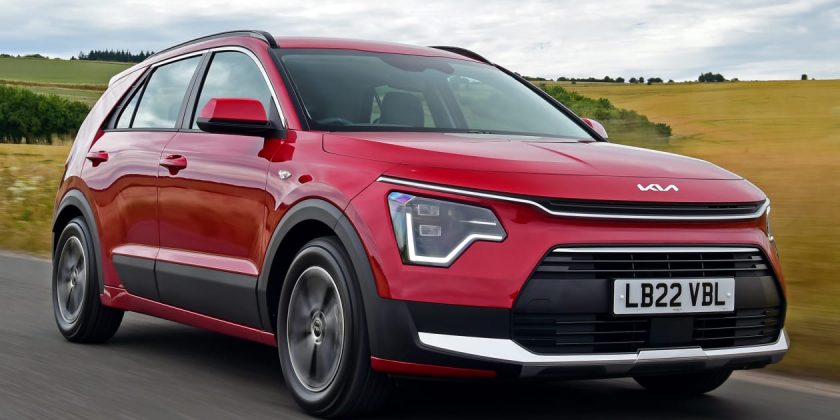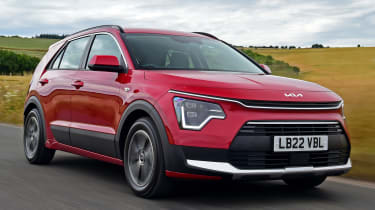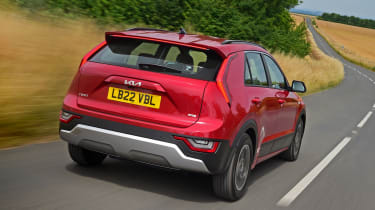Efficient, practical and boasting excellent onboard technology, the Kia Niro is a family SUV that offers great value for money
- 1Verdict – currently reading
- 2Engines, performance and drive
- 3MPG, CO2 and running costs
- 4Interior, design and technology
- 5Practicality, comfort and boot space
- 6Reliability and safety
4.5 out of 5
Price£24,855 to £29,535
- Practicality
- Efficient powertrains
- Improved infotainment
- Not fun to drive
- Interior quality
- Small boot in plug-in hybrid model
Top 10 best hybrid SUVs to buy 2022
- Toyota Yaris Cross vs Kia Niro: 2021 group test review
- Kia Niro PHEV vs MINI Countryman PHEV
- Hyundai Kona Hybrid vs Kia Niro Hybrid
- Kia Niro review
- New Kia Niro PHEV 2022 review
- New Kia Niro EV 2022 review
- New Kia Niro Hybrid 2022 review
- New Kia Niro EV prototype review
- 1Verdict – currently readingEfficient, practical and boasting excellent onboard technology, the Kia Niro is a family SUV that offers great value for money
- 2Engines, performance and driveDesigned with comfort in mind rather than driving fun, although the Niro EV has a decent turn of pace
- 3MPG, CO2 and running costsThe Kia Niro offers a range of efficient electrified powertrains which should help to lower running costs
- 4Interior, design and technologyWhile onboard technology has improved, the Niro’s cabin quality isn’t class leading
- 5Practicality, comfort and boot spaceThe Kia Niro has grown in size, with generous cabin space and practical storage options meaning it’s a great family choice
- 6Reliability and safetyThe Niro’s excellent safety kit and seven-year warranty cover should reassure buyers, while reliability should be strong, too
The Niro once again delivers on the practicality front, and any notion that the new K3 platform would be compromised due to the mix of internal combustion and pure-electric powertrains can be dismissed; the hybrid model is a tough competitor in a congested market, while the plug-in hybrid offers the flexibility of its electric power that is impressive as well as efficient. The range-topping Niro EV doesn’t offer world-beating range, but its versatility, comfort and excellent onboard technology will appeal to family and business users alike.
Cabin space across the Niro range is superb and its low running costs are impressive, but just like the old car, the Niro doesn’t feel all that special to drive and some of its interior quality is lacking. That aside, the Niro (in whichever form you choose) is a strong contender across a variety of segments.
About the Kia Niro
Kia launched the first-generation Niro in the UK back in 2016 and it was a smash hit. It managed to win plenty of Auto Express group tests against esteemed opposition and the all-electric e-Niro won our 2019 Affordable Electric Car of the Year award. This second-generation model looks to follow in the footsteps of the original with the small SUV once again being offered with hybrid, plug-in hybrid and fully electrified variants (although the electric Niro is now called the Niro EV).
Given the Niro is offered with three distinct powertrains, it’ll have a wide variety of competition. The hybrid will go up against the likes of the Honda HR-V and the Renault Arkana as well as the usual cohort of mild-hybrid and hybrid hatchbacks such as the Toyota Corolla. The plug-in hybrid will do battle with the Hyundai Tucson, Peugeot’s 3008 and the Ford Kuga. The pure-electric Niro EV will have Volkswagen’s ID.3 and ID.4, the Cupra Born, Citroen e-C4 and many more to stand out against.
More reviews
Car group tests
In-depth reviews
Road tests
The Niro has received a major makeover for its second generation with an entirely new front-end design with pinched headlights and a single light cluster below (quite similar to BMW’s recent design language). The electric Niro EV gets a slightly different face due to the charging port being located at the front, rather than on the front wing of the Niro PHEV.
Like the old model, the Niro hybrid utilises the same 104bhp 1.6-litre GDi (Gasoline Direct Injection) petrol engine combined with a 43bhp electric motor for an overall output of 139bhp. The same petrol engine features in the plug-in hybrid, but it’s mated to an 83bhp electric motor for a 180bhp total output. Both hybrids get a six-speed dual-clutch automatic transmission.
The new 64.8kWh battery found in the Niro EV is barely any bigger than the old e-Niro’s unit and the powertrain’s output is the same at 201bhp. But range is up an extra five miles to 285 miles and recharging from 10 to 80 per cent can take 45 minutes, which is nine minutes quicker than the old e-Niro.
The trim level lineup remains unchanged with the Niro kicking off with the entry-level ‘2’, then the ‘3’ and finally top-spec ‘4’.
Pricing for the cheapest 2 Hybrid model starts from around £28,000, while you’ll need at least £33,500 to bag a Niro PHEV version. The all-electric Niro EV is the most expensive option; around £36,000 for the entry ‘2’ variant and more than £42,000 for the top-of-the-range ‘4’ with a heat pump.
For an alternative review of the Kia Niro, visit our sister site carbuyer.co.uk…
Next Steps
In this review
Source: Read Full Article



 Top 10 best hybrid SUVs to buy 2022
Top 10 best hybrid SUVs to buy 2022